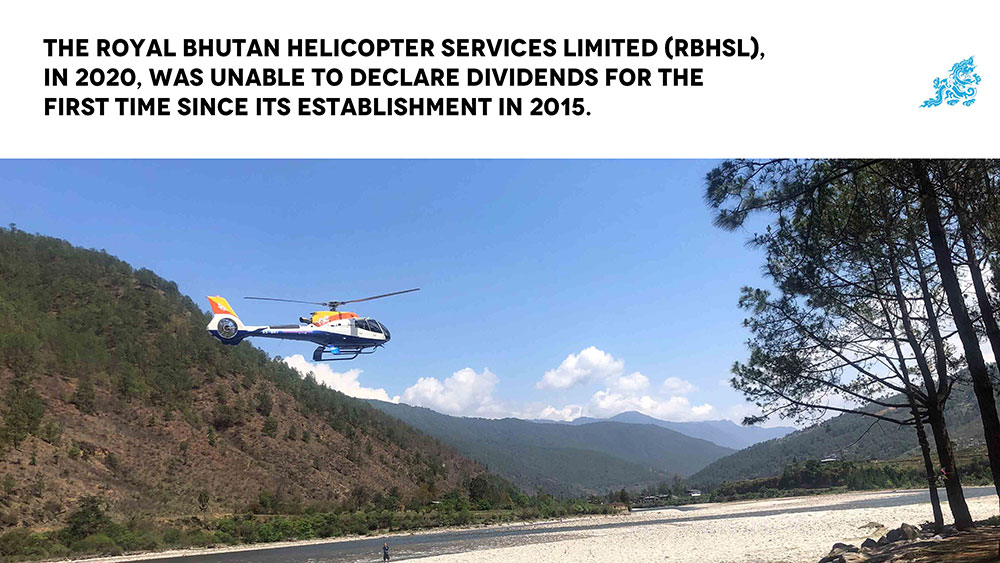Pandemic incurred Nu 62.56M in loss last year
Yangchen C Rinzin
The coronavirus pandemic stopped the Royal Bhutan Helicopter Services Limited (RBHSL) from soaring high and forcing the company to Nu 62. 56 million (M) in the red in 2020.
RBHSL generated revenue of Nu 66.25 million (M) during the 2020 fiscal year, but this is not even half of the operating cost of Nu 126.98M the company had to bear in the same year.
It generated Nu 161.45M in 2019 and earned a profit of Nu 14.73M after paying tax.
The chief executive officer (CEO), Chhewang Gyeltshen, said that following the outbreak of coronavirus and the first Covid-19 case since March 5 last year, RBHSL has been affected on the commercial front.
This is the first time the company faced loss since its establishment in 2015. “The total net loss was Nu 62.56M last year,” he said.
Operating cost includes expenses like salaries for 39 employees including the CEO and the aircraft operational cost. “We did not lay off any staff despite the hurdles. We instead took other measures to limit expenses that were not required.”
The CEO added that for the first time the company could not declare dividends. The RBHSL contributed a Nu 11.5M dividend to the finance ministry in 2019. The company has generated revenue of about Nu 33.61M as of May 31 this year.
Chhewang Gyeltshen said that fixed cost is higher in operating helicopter service. “But we’re sustaining on revenues from medical evacuation flights and hiring charges from the highlanders. It’s becoming challenging to meet the operation cost.”
RHBSL also provides services like fire fighting, medical/case evacuation, cargo/freight transport, and passenger transport.
It has operated 688 medical evacuations so far since 2015, including the recent tragedy in Laya where five highlanders injured during the landslides were rescued to the referral hospital in Thimphu.
RBHSL has also conducted 21 circuits in times of fire fighting in 2021. While the health ministry pays for medical evacuations, the department of disaster management pays for disaster related operations.
The RBHSL usually generates 60 percent of revenue from tourist charter flights where tourists pay an hourly fee of USD 4,375 per hour, and 40 percent from a local emergency or local travel.
Considering the downturn in business and the need for the highlanders, besides the impact of the virus on highlanders, RBHSL also reduced the charges. RBHSL has reduced the charge to Nu 100,000 per hour from Nu 150,000.
While highlanders bear 50 percent of the hiring charge, the government, as a subsidy to the people in the mountains, bears the other half.
Chhewang Gyeltshen said that the rate was reduced during the Covid-19 pandemic to stimulate the local market and it became a steady source of revenue to the RBHSL.
Going ahead, the company has also introduced innovative helicopter services for domestic use where people can hire the chopper for sightseeing from above for Nu 1,500 a person for five minutes in Paro.
“This is quite popular with the locals and a steady source of revenue when business is down,” Chhewang Gyeltshen said.


